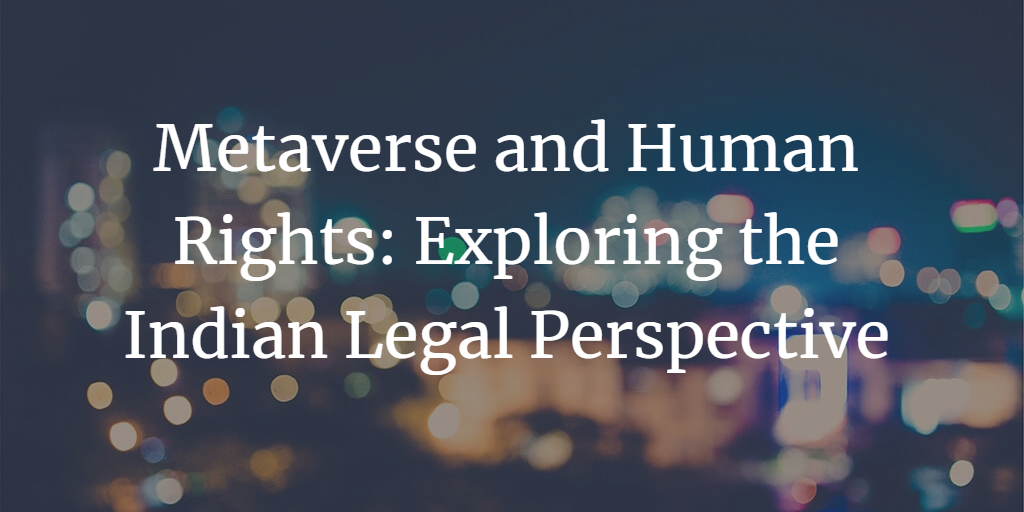Metaverse and Human Rights: Exploring the Indian Legal Perspective

Table of Contents
Introduction
Understanding the Metaverse
Human Rights Concerns in the Metaverse
Indian Legal Perspective
Challenges and Opportunities
Recommendations
Conclusion
Introduction
The Metaverse is an emerging digital realm that has garnered significant attention in recent years. As this virtual world continues to develop, it raises essential questions about human rights and the application of existing laws. This article explores the intersection of the Metaverse and human rights from an Indian legal perspective, discussing potential challenges and opportunities.
Understanding the Metaverse
The Metaverse refers to a shared, persistent, and interactive virtual world where users can create, socialize, and interact through digital avatars. It encompasses various technologies, including virtual reality (VR), augmented reality (AR), and blockchain, creating an immersive and interconnected digital environment.
Human Rights Concerns in the Metaverse
As the Metaverse evolves, it raises several human rights concerns:
Privacy: The collection, storage, and sharing of personal data in the Metaverse may infringe upon individuals' right to privacy.
Freedom of expression: Content moderation and censorship in the Metaverse can potentially restrict freedom of expression.
Discrimination: Virtual spaces may perpetuate or exacerbate existing forms of discrimination, such as gender, race, or disability-based discrimination.
Digital divide: Limited access to technology and digital literacy may exacerbate existing social and economic inequalities.
Indian Legal Perspective
India's legal framework for addressing human rights concerns in the Metaverse includes:
Right to Privacy: The right to privacy is protected under Article 21 of the Constitution of India, as interpreted by the Supreme Court. The Personal Data Protection Bill, 2019, once enacted, will provide a comprehensive framework for data protection.
Freedom of Expression: Article 19(1)(a) of the Constitution guarantees freedom of speech and expression, subject to reasonable restrictions.
Anti-discrimination laws: India has various anti-discrimination laws, such as the Protection of Civil Rights Act, 1955, and the Scheduled Castes and Scheduled Tribes (Prevention of Atrocities) Act, 1989, which prohibit discrimination based on caste, race, and other grounds.
Challenges and Opportunities
The Metaverse presents both challenges and opportunities for human rights in the context of Indian law:
Jurisdiction: Determining jurisdiction in the Metaverse, which transcends national boundaries, poses a significant challenge.
Enforcement: Enforcing existing laws in the Metaverse may be difficult due to the decentralized and anonymous nature of the digital realm.
Adapting existing laws: Indian laws may need to be adapted or expanded to address the unique characteristics of the Metaverse.
Promoting digital inclusion: The Metaverse can provide opportunities for social interaction, economic growth, and innovation, provided that digital inclusion is prioritized.
Recommendations
To address human rights concerns in the Metaverse and ensure a fair and inclusive digital environment, the following recommendations can be made:
Develop comprehensive legislation: India should develop comprehensive legislation that specifically addresses the unique challenges posed by the Metaverse, including data protection, content moderation, and anti-discrimination provisions.
International cooperation: Engage in international cooperation and dialogue to develop shared norms, standards, and regulatory frameworks for the Metaverse.
Promote digital literacy and inclusion: Invest in initiatives that promote digital literacy and ensure equitable access to technology, reducing the digital divide and fostering inclusivity within the Metaverse.
Raise awareness: Conduct public awareness campaigns to educate users about their rights and responsibilities within the Metaverse and promote responsible digital behavior.
Conclusion
The Metaverse presents both challenges and opportunities for human rights in the context of Indian law. By adopting a proactive approach, developing comprehensive legislation, and prioritizing digital inclusion, India can effectively address human rights concerns in the Metaverse and harness its potential for social and economic development.


